

Lawsuit Loans & Lawsuit Funding. Finance Companies Making Moves Online. Obama boosts global collaboration to conquer US economic crisis. Artificial intelligence: Difference Engine: Luddite legacy. AN APOCRYPHAL tale is told about Henry Ford II showing Walter Reuther, the veteran leader of the United Automobile Workers, around a newly automated car plant.
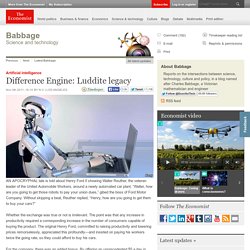
“Walter, how are you going to get those robots to pay your union dues,” gibed the boss of Ford Motor Company. Without skipping a beat, Reuther replied, “Henry, how are you going to get them to buy your cars?” Whether the exchange was true or not is irrelevant. The point was that any increase in productivity required a corresponding increase in the number of consumers capable of buying the product. The original Henry Ford, committed to raising productivity and lowering prices remorselessly, appreciated this profoundly—and insisted on paying his workers twice the going rate, so they could afford to buy his cars.
America’s Three Deficits - Laura Tyson. Exit from comment view mode.
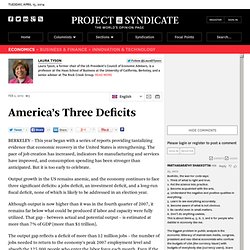
Click to hide this space BERKELEY – This year began with a series of reports providing tantalizing evidence that economic recovery in the United States is strengthening. The Economy is Killing Las Vegas. "Democratic Inequality" by Raghuram Rajan. Exit from comment view mode.

Click to hide this space CHICAGO – Why did the household savings rate in the United States plummet before the Great Recession? The Age of Double Standards. “But, Yossarian, suppose everyone felt that way.”

Income Inequality Is Killing the Economy, Obama Says—Is He Wrong? - Derek Thompson - Business. The president wants to turn inequality into both a campaign banner and a grand unifying theory of the recovery.
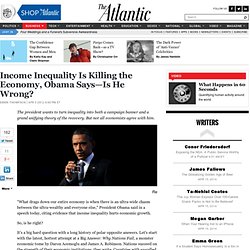
But not all economists agree with him. Reuters "What drags down our entire economy is when there is an ultra-wide chasm between the ultra-wealthy and everyone else," President Obama said in a speech today, citing evidence that income inequality hurts economic growth. So, is he right? It's a big hard question with a long history of polar opposite answers. A sweeping answer is helpful. The Poor Are Getting Poorer. Is It Time to Raise the Minimum Wage? - Jordan Weissmann - Business. One of the harshest realities of America's slow economic recovery -- and there are many -- is the fact in spite of modest job growth, pay for workers is falling.
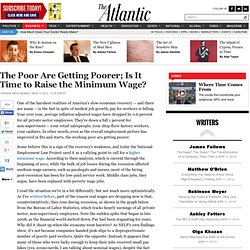
Year over year, average inflation adjusted wages have dropped by 0.6 percent for all private sector employees. They're down a full 1 percent for non-supervisors -- your retail salespeople, your shop floor factory workers, your cashiers. In other words, even as the overall employment picture has improved in fits and starts, the working poor are getting poorer. Why America spends while the world saves. Editor's Note: The following is an edited transcript of my interview with Sheldon Garon, a professor of history and East Asian studies at Princeton University and author of the new book, Beyond Our Means: Why America Spends While the World Saves.
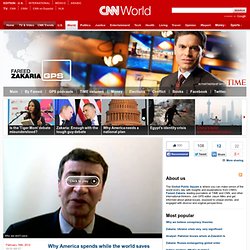
Why Americans don't save Amar C. Bakshi: U.S. household saving rates peaked in the 1980s at around 11 percent, and by 2005, they had plummeted to near zero. How did America go from a nation of savers to a nation of consumers? Sheldon Garon: Well, in fact, before World War II we weren’t a nation of great savers. "The American Recovery" by Mohamed A El-Erian. Exit from comment view mode.
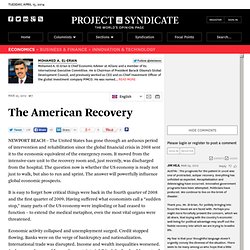
Click to hide this space NEWPORT BEACH – The United States has gone through an arduous period of intervention and rehabilitation since the global financial crisis in 2008 sent it to the economic equivalent of the emergency room. It moved from the intensive-care unit to the recovery room and, just recently, was discharged from the hospital. The question now is whether the US economy is ready not just to walk, but also to run and sprint. The answer will powerfully influence global economic prospects. A Nation of Spoiled Brats - Interview by David Rothkopf. Financial Times columnist Edward Luce has written a new book called Time to Start Thinking: America in the Age of Descent that has received well-deserved acclaim and recognition not only for its superb reporting of the on-ground reality of America's current economic crisis but also because it is an unflinchlingly brave book.

Luce does not shy away from conclusions that are hard for many Americans to hear, nor does he cop out and offer up the happy ending many in his audience may want to read. Rather, he offers what is most needed now: an objective, profoundly thoughtful look at the underpinnings of America's economic troubles, what makes the current crisis different from those of the past, and where we are likely headed from here. Luce recently sat down with Foreign Policy CEO and Editor-at-Large David Rothkopf. Here are some of the highlights of their conversation. Foreign Policy: The debate about whether the U.S. is declining is raging. "The Energy Deficit" by Michael Spence. Exit from comment view mode.
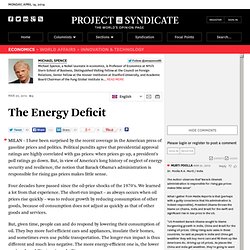
Click to hide this space MILAN – I have been surprised by the recent coverage in the American press of gasoline prices and politics. Political pundits agree that presidential approval ratings are highly correlated with gas prices: when prices go up, a president’s poll ratings go down. But, in view of America’s long history of neglect of energy security and resilience, the notion that Barack Obama’s administration is responsible for rising gas prices makes little sense. The Spectacular Rise and Fall of U.S. Whaling: An Innovation Story - Derek Thompson - Business. An extinct business offers surprisingly current lessons about the triumph of technology, the future of work, and the inevitable decline of industries that might not be worth saving "Some years ago -- never mind how long precisely -- having little or no money in my purse, and nothing particular to interest me on shore, I thought I would sail about a little and see the watery part of the world.
" -- Moby Dick One hundred and fifty years ago, around the time Herman Melville was completing Moby Dick, whaling was a booming worldwide business and the United States was the global behemoth. Is the U.S. feeling pressure about the World Bank presidency? Robin Harding and John-Paul Rathbone insist that the United States is feeling pressure from the developing world over the World Bank leadership question. They also think the dynamic surrounding the Bank leadership race is quite different than it was in the case of the International Monetary Fund: In contrast to the recent battle to lead the International Monetary Fund, which was never in real doubt as French finance minister Christine Lagarde raced around the world to secure support, developing countries are organised to challenge a procession to the World Bank presidency.
"We as emerging markets and developing countries have been making a concerted effort to identify our most qualified and competent candidates," said Amar Bhattacharya, director of the G24 office in Washington. The G24 is an economic umbrella group for the largest developing countries, and the Brics group of Brazil, Russia, India and China has also been active in debating candidates. A qualified defense of national privilege. What Export-Oriented America Means - Tyler Cowen. In his State of the Union address two years ago, President Obama promised to double American exports over the next five years. At the time critics called this an unrealistic political promise, one that voters would forget by the 2012 election. But America is currently on track to meet that goal. As of early 2012, exports measure in at about $180 billion each month, whereas two years ago it was $140 billion per month.
The growth rate of exports is about 16 percent per year, a trend that at least conceivably could get us to Obama’s target. Since the recession officially ended, exports have accounted for about half of the nation’s economic growth. United States' economy: Over-regulated America. Gray Nation: The Very Real Economic Dangers of an Aging America - Derek Thompson - Business. Two economists envision a scary -- and scarily realistic -- future where the working population expands slower and slower, and jobless recoveries are the only recoveries we know Reuters In the future, U.S. growth will be slower. Recessions will be deeper. Recoveries will be weaker. And there's exactly one thing to blame. The Two Issues That Can Bring Down the Economy. "Fed Policy and Inflation Risk" by Martin Feldstein. Exit from comment view mode. Click to hide this space CAMBRIDGE – During the past four years, the United States Federal Reserve has added enormous liquidity to the US commercial banking system, and thus to the American economy.
The Mobility Myth. Manufacturing Illusions) Suddenly, manufacturing is back – at least on the election trail. But don’t be fooled. The real issue isn’t how to get manufacturing back. It’s how to get good jobs and good wages back. They aren’t at all the same thing. Republicans have become born-again champions of American manufacturing. Mitt Romney says he’ll “work to bring manufacturing back” to America by being tough on China, which he describes as “stealing jobs” by keeping value of its currency artificially low and thereby making its exports cheaper.
Rick Santorum promises to “fight for American manufacturing” by eliminating corporate income taxes on manufacturers and allowing corporations to bring their foreign profits back to American tax free as long as they use the money to build new factories. President Obama has also been pushing a manufacturing agenda. But American manufacturing won’t be coming back. Bringing back American manufacturing isn’t the real challenge, anyway. Can Radical Efficiency Revive U.S. Manufacturing?